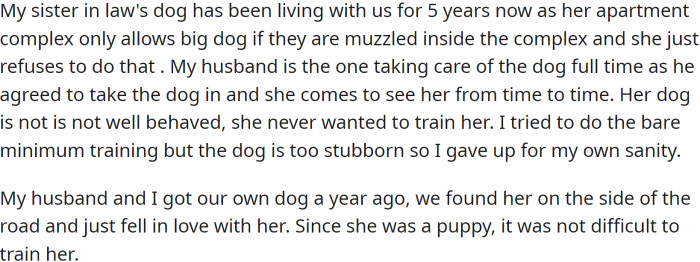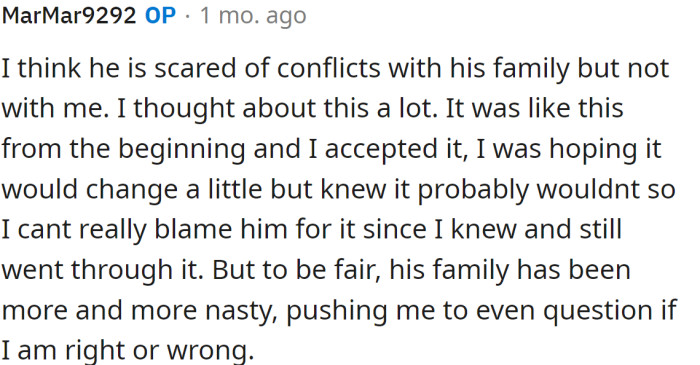Woman Gets Criticized For Not Walking SIL's Dog She Was Literally Forced To Take In
OP has been caring for her sister-in-law's dog for five years now, as her SIL's apartment complex only allows big dogs if they are muzzled. OP's husband took on the responsibility of caring for the dog full-time, as he agreed to take it in.
The dog was never trained, and OP tried to do the bare minimum training, but the dog was too stubborn, so OP gave up for her own sanity. A year ago, OP and her husband found their own dog on the side of the road and fell in love with her.
The puppy was easy to train, and the couple walked her a lot. This enrages OP's SIL, who claims OP should walk both dogs together or one after the other.
OP can't handle both dogs at the same time and doesn't have the time or desire to do two walks. When OP's SIL visits her dog, she doesn't walk her either for the same reasons of her being aggressive and pulling.
OP's SIL then says OP neglects her dog because she walks alone, not hers. OP is wondering if she is in the wrong for not wanting to walk her SIL's dog.
Read the full story below:
OP asks:

OP has been caring for her sister-in-law's dog for five years now, as her SIL's apartment complex only allows big dogs if they are muzzled.

This enrages OP's SIL, who claims OP should walk both dogs together or one after the other. OP can't handle both dogs at the same time and doesn't have the time or desire to do two walks.

Understanding Familial Responsibility
Family dynamics often dictate the roles individuals play within a household, which can lead to feelings of obligation or resentment, especially when expectations are misaligned. As noted by Dr. Shefali Tsabary, a renowned parenting expert, “When family members feel pressured to fulfill roles they did not choose, it can create significant emotional strain.” This phenomenon is particularly pronounced in family caregiving situations, where one member may feel compelled to take on responsibilities that were not mutually agreed upon. This can create a cycle of emotional burden, especially when the caregiver feels unsupported or taken for granted.
In this context, OP's situation with her sister-in-law's dog exemplifies how familial obligations can lead to stress and frustration. Dr. John Gottman, a leading marriage researcher, emphasizes that “clear communication about roles and responsibilities is essential for maintaining healthy family dynamics.” When family members openly discuss their expectations and negotiate responsibilities, they're more likely to reach a consensus that respects everyone’s boundaries.
Ultimately, the interplay of familial expectations and personal boundaries is a common struggle in many households. The importance of open dialogue cannot be overstated; it fosters an environment where family members feel safe to express their needs and negotiate responsibilities. Research by family therapists emphasizes that frequent, honest conversations about expectations can reduce misunderstandings and create a more supportive family climate.
For OP, initiating a family meeting to discuss the care of the dog could serve as a constructive step forward. Encouraging all family members, including her sister-in-law, to share their thoughts and feelings about the situation can help in reaching a consensus that honors everyone's needs and promotes a more harmonious living situation.
The Challenges of Shared Responsibilities
Living with a pet, especially one with special needs, can create unique challenges in shared living environments. In this case, the request for the elderly cat to stay in a bedroom reflects the complexities of managing space and comfort in roommate relationships.
Research in social psychology highlights how differing expectations about responsibilities can lead to conflicts among roommates.
When OP's SIL visits her dog, she doesn't walk her either for the same reasons of her being aggressive and pulling.

OP posted an edit:

SIL has a nasty attitude

The concept of boundary setting is crucial in family relationships, particularly when one person feels overwhelmed by another's expectations. Studies conducted by Dr. Henry Cloud, a clinical psychologist, emphasize that establishing boundaries is not only a form of self-care but also a means of maintaining healthy relationships. When individuals articulate their limits, they help others understand what is acceptable and what is not, thereby preventing feelings of resentment.
In OP's case, a constructive approach could involve having a candid conversation with her sister-in-law about the dog's care and exploring options for more shared responsibility. This could include discussing the possibility of training the dog together or even seeking professional help to address the dog's behavioral issues. By taking these steps, OP can reclaim her autonomy while also addressing the needs of the dog and the expectations of her family.
Roommate dynamics often involve navigating personal preferences and the needs of pets. Studies indicate that establishing clear boundaries and responsibilities can help mitigate potential conflicts.
In this scenario, discussing the cat's needs and how they impact the shared living space can lead to more cooperative arrangements.
OP has experience training dogs

OP has offered the following explanation for why they think they might be the a-hole:

"Your husband agreed to take the dog and has had her for five years."

The Psychological Impact of Caregiving
Research in the field of caregiving highlights that prolonged responsibility for another's pet can lead to significant emotional strain. According to a systematic review published in the Journal of Gerontology, caregivers often experience feelings of isolation, anger, and burnout, particularly when they perceive their efforts to go unrecognized. This emotional toll can severely impact mental health, leading to increased anxiety and depressive symptoms.
Furthermore, the lack of training for the dog, as noted by OP, can exacerbate feelings of helplessness and frustration. Behavioral psychologists recommend incorporating structured training sessions, which can not only improve the dog's behavior but also enhance the owner's confidence and satisfaction in their caregiving role. Engaging in positive reinforcement techniques can foster a deeper bond between OP and the dog while also alleviating some of the stress associated with untrained behaviors.
Understanding Pet Behavior and Aging
As pets age, their behavior and needs change, which can significantly impact household dynamics. Research in animal behavior suggests that elderly pets may require more specialized care, which can add stress to shared living situations.
Understanding these changes is crucial for roommates to empathize with each other's experiences and challenges.
OP replied:

This Redditor says:

These are good questions:

Emotional intelligence is crucial for navigating complex family dynamics, particularly when obligations feel overwhelming. According to Dr. Terri Orbuch, a relationship researcher, "Being emotionally intelligent allows individuals to recognize their own feelings and those of others, which is essential for effective communication." This skill set encompasses self-awareness, empathy, and emotional regulation, all of which can significantly improve interpersonal interactions. For OP, enhancing her emotional intelligence might involve reflecting on her feelings about the dog's care while also considering her sister-in-law's viewpoint. By engaging in active listening and articulating her needs without assigning blame, OP can create a more cooperative family environment, potentially leading to solutions that address everyone's concerns.
To create a more harmonious living environment, implementing strategies to accommodate the cat's needs while also respecting everyone's comfort is essential. This might include designating specific spaces for the cat and establishing routines that minimize disruption.
Additionally, training and behavioral modification techniques can help manage any aggressive tendencies, benefiting both the pet and the roommates.
OP replied:

There are four people in this relationship and OP comes dead last.

The bottom line is:

Navigating Competing Responsibilities
Individuals often face competing demands in their lives, which can lead to internal conflict and stress, particularly when family obligations are involved. Dr. Angela Duckworth, a renowned psychologist and author, states, "When we struggle to meet our responsibilities, it can lead to feelings of inadequacy and frustration." Establishing priorities and realistic expectations is essential for maintaining mental well-being in such situations, as highlighted on her professional website, angeladuckworth.com. For OP, it could be beneficial to reassess her commitments and determine which responsibilities are most important to her. Utilizing tools such as a priority matrix can help visualize which tasks require immediate attention and which can be delegated or postponed. This way, OP can find a sustainable balance between caring for her own needs and fulfilling family obligations.
The Role of Communication in Roommate Relationships
Effective communication is vital for resolving conflicts in shared living situations. Research emphasizes that open dialogue about feelings and concerns can lead to better understanding and cooperation among roommates.
In this case, discussing the cat's needs and the impact on shared spaces can facilitate a more amicable resolution.
If you give your dog to someone else, you have to accept that they are now in charge of its care. You can't complain about the way they are taking care of it because it is now their responsibility to do what they deem best for the dog.
You gave up your right to be the primary caretaker when you handed the dog off to another person. It is important to recognize that the new caretaker may have a different approach to caring for the dog than you did.
They may feed it different food or exercise it differently. It is important to accept these differences and respect their decisions. It is also important to trust that they are taking good care of the dog and that it is being provided with the same love and care that you provided.
Giving your dog to someone else is a difficult decision, but you can rest assured that it is in good hands if you have found a responsible, loving new home for it. You just need to let go and trust that the new caretaker is doing what is best for the dog.
Establishing regular check-ins or meetings can help roommates express their thoughts and feelings about the living situation. This proactive approach can prevent misunderstandings and foster a sense of teamwork.
Encouraging roommates to engage in collaborative problem-solving can lead to more satisfying outcomes for everyone involved.
Exploring the Emotional Impact of Pets
Pets often play significant roles in our lives, providing companionship and emotional support. However, their needs can also create stress in shared living environments.
Research in psychology suggests that understanding the emotional dynamics around pet ownership can help roommates navigate their relationships more effectively.
Encouraging empathy and compassion toward each other's experiences can foster a more supportive living environment. By recognizing the challenges of caring for an elderly pet, roommates can work together to create a comfortable space for everyone.
Ultimately, fostering a culture of understanding and collaboration can enhance the overall living experience.
Psychological Analysis
This situation reflects the complexities of roommate dynamics when pets are involved. Navigating the needs of an elderly cat while respecting shared spaces can be challenging.
Encouraging open dialogue about responsibilities and establishing clear boundaries can help foster a more positive living environment for everyone.
Analysis generated by AI
Analysis & Alternative Approaches
Research consistently shows that effective communication and empathy are key components of successful roommate relationships. Addressing conflicts surrounding pet ownership requires understanding and cooperation.
As studies suggest, creating an environment where all individuals feel heard and respected facilitates more harmonious living arrangements.
Moving Forward: Actionable Steps
Navigating the complexities of familial obligations can be challenging, especially when those responsibilities feel overwhelming or unrecognized. Research consistently shows that fostering open communication and establishing clear boundaries are essential for maintaining healthy family dynamics and individual mental well-being. By taking proactive steps to negotiate responsibilities and express needs, individuals can mitigate feelings of resentment and create a more supportive environment for everyone involved.
Ultimately, the goal is to cultivate a dynamic where both personal autonomy and family cohesion are prioritized, allowing for growth and satisfaction in all relationships.



